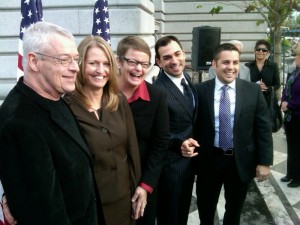
The California Supreme Court voted 7-0 Wednesday to answer a question put to them by the federal court considering the constitutionality of Prop. 8: "Does state law give the official proponents of an initiative the legal authority to defend the measure's constitutionality when public officials charged with that duty refuse to do so?"
Their answer -- which could come as early as this fall -- will be pivotal in the ultimate outcome of the Prop. 8 legal tussle. The question of "legal standing" was first raised by the three-judge panel of the Ninth Circuit Court of Appeals in San Francisco during oral arguments last year. The judges seemed genuinely puzzled by the question, so they turned to the California Supreme Court for help answering it.
In agreeing to take up the question Wednesday, the court put the question on a legal fast track. The opening brief on the merits is due March 14th. Oral arguments in the matter could come as early as September -- lightning fast by Supreme Court standards.
Their answer is consequential either way. If the court decides ballot measure proponents LACK legal standing, the Appeals Court will then have little choice but to dismiss the appeal before them. It would mean the lower court ruling declaring Prop. 8 unconstitutional stands, opening the door once again to same sex marriages in California. It would also reduce the likelihood that this case will reach the U.S. Supreme Court, where it would meet a very uncertain fate.
On the other hand if the justices say proponents DO have legal standing, the Appeals Court judges would then be free to consider questions about Prop. 8 on the legal merits. They could issue a sweeping decision requiring all states in the Ninth Circuit to allow same sex marriage. Or they could issue a much narrower decision that would apply only to California.